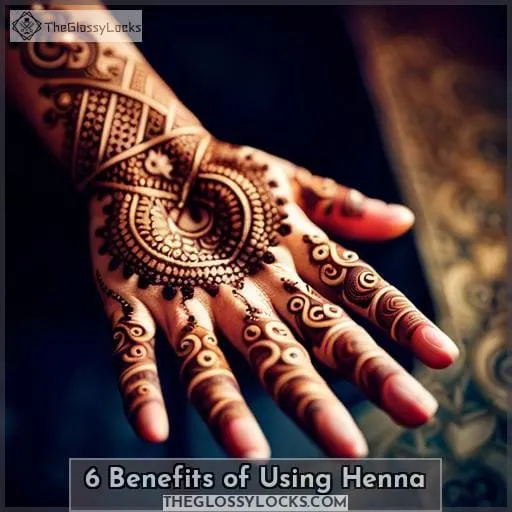This site is supported by our readers. We may earn a commission, at no cost to you, if you purchase through links.

But what about overnight applications? Should you keep henna on your hair overnight or not? In this article, we discuss the benefits of leaving henna in overnight – ranging from deeper color intensity to time savings – as well as potential hazards if left on too long.
We’ll also explore how often one should use it and whether it is suitable for everyone’s needs.
So read ahead to find out whether keeping henna on your head all night is beneficial or detrimental!
Table Of Contents
- Key Takeaways
- Benefits of Leaving Henna in Overnight
- What Happens if You Leave Henna on Too Long?
- Can I Leave Henna in Overnight?
- Will Leaving Henna on for Longer Make Color Darker?
- Can Henna Damage Your Hair?
- How Often Should I Dye My Hair With Henna?
- How to Apply Henna on Hair
- Who Should Dye Their Hair With Henna?
- 6 Benefits of Using Henna
- How Do You Make Henna Dye Darker?
- Conclusion
Key Takeaways
- Leaving henna on overnight results in a deeper color intensity.
- Gray hair coverage is improved with overnight henna application.
- Potential hazards of leaving henna on too long include over-dyeing and hair damage.
- Prolonged henna exposure can cause scalp irritation.
Benefits of Leaving Henna in Overnight
Are you looking for a deeper color intensity, gray hair coverage, and a time-saving option? Then leaving your henna overnight may be the best choice! Henna can give you intense color while also saving precious time in the morning.
Deeper color intensity
Leaving henna on overnight gives you a richer, more vibrant color than if left for just an hour or two. The longer duration of the dye absorption helps to increase hair pigmentation and results in deeper color intensity that can’t be achieved with shorter application times.
Henna is known for its highly saturated colors, and when allowed to stay in your hair overnight, it has time to deeply penetrate the strands. This results in a bolder hue that will last much longer than normal coloring methods.
Keeping henna on overnight also ensures even coverage throughout each strand of hair, making sure no area is missed.
Gray hair coverage
By allowing henna to sit overnight, you can achieve a more dramatic color change or improved coverage of gray hair. Leaving it in for a longer period helps the dye penetrate deeper into the scalp, providing fuller and richer color that lasts longer.
Here are some reasons why leaving henna in overnight is beneficial:
- Prevents premature graying by covering grey hairs
- Natural ingredients provide nourishment for your scalp and hair strands
- Does not contain any harsh chemicals like other dyes do
- Easy application process with no need to mix multiple ingredients together before use
- Results last much longer than chemical dyes as there is less fading over time.
Henna provides an effective solution when looking to cover pesky grey hairs without having to resort to potentially damaging chemical dyes.
Time-saving option
You can save time by leaving henna in overnight, allowing you to rinse, condition, and style your hair quickly the next morning. Overnight application of henna is a great way to reap all its benefits without having to spend extra time during the day.
It’s an efficient use of time for busy individuals who need longer-lasting results from their hair care routine. Not only does an overnight application make it easier to achieve color depth and gray coverage, but it also promotes strength and shine in one single step! Plus, this method prevents any leakage that may occur if you apply too thickly, which can leave stains on fabric or furniture.
So why not give it a try? You’ll be surprised at how much faster your hair care routine becomes with just one simple change – applying henna overnight!
What Happens if You Leave Henna on Too Long?
If you exceed the recommended amount of time for leaving henna on your hair, it can lead to dryness and potential damage. Leaving henna on too long can result in over-dyeing, which could cause color staining and permanent hair damage.
Additionally, scalp irritation is a possibility if left on longer than suggested. This happens when the chemicals used in the formula are not properly diluted or removed from the skin after applying.
There are several potential risks associated with leaving henna overnight that should be considered before making a decision:
- Negative Effects: Over-dyeing may occur, resulting in an undesirable color outcome that will last until it grows out or another dye job is done to fix any mistakes made during the application process.
- Hair Damage: Excessively using henna may weaken strands due to chemical reactions between ingredients used, causing breakage and leading to split ends. It can also cause dryness caused by heat and lack of moisture retention over time if applied thickly.
Can I Leave Henna in Overnight?
It is possible to leave henna in overnight. Many people opt to do this as it can help achieve a deeper color and stronger hair, as well as allow for more dramatic color change or gray coverage. However, when leaving henna on overnight, you should be aware of the risks associated with doing so.
Depending on how long you leave the henna in your hair, it will determine how much moisture it absorbs and therefore affect the intensity of its coloring outcome. Leaving your henna on longer than necessary can result in an overly dark dye job that may not suit your desired style or look natural against lighter colored skin tones.
Additionally, sticking too close to certain areas such as around eyes could cause irritation due to prolonged exposure time. This may lead to more serious side effects like burning sensations or swelling if left untreated immediately afterwards.
When considering whether applying and leaving henna overnight is the right choice for you, first consider what length of time would work best for achieving a desired hue without over-saturating strands with product.
It is important to ensure enough absorption takes place during the application itself.
If done correctly, this method has been known to produce beautiful results. However, it also comes with potential hazards that one must take into consideration before taking part in any sort of procedure involving propylene glycol-based ingredients found within many dyes used today.
Ultimately, deciding upon whether keeping henna in overnight is the right choice requires careful research, preparation, understanding of the risks involved, and weighing the pros and cons of each individual’s specific situation accordingly.
Will Leaving Henna on for Longer Make Color Darker?
Leaving henna on for longer periods of time can help you achieve a darker, richer color. When applying henna to your hair, it is important to consider the dyeing techniques and how long the application should be left on for optimal results.
The amount of time needed may vary depending on your desired outcome and hair type.
For those seeking more vibrant colors or greater coverage over gray hairs, leaving hennas in overnight is recommended as this gives it ample time to produce brighter hues when used with natural dyes like indigo or cassia obovata powder mixes.
When using these mixing powders with hennas, however, you will need an even lengthier duration than just overnight.
Some key points summarizing its usage:
- Dyeing techniques: Consider what method would work best given the desired result and overall look wanted with Henna applications and other natural dyes such as Indigo and Cassia Obovata Powder Mixtures too.
- Optimal Duration: Different Hair Types have their own needs requiring varying amounts of Contact Time (12-24 hours) being ideal when looking towards Deeper shades that last Longer.
- Color Variations: Seek out Vivid Color Changes by Leaving Hennas Overnight but take into account individual Hair Type requirements prior to doing so.
- Natural Hair Dye: Utilize Henna’s inherent properties alongside other Powder Mixes (Indigo/Cassia Oblovata) achieving Optimum Results through experimenting beforehand.
No matter what level of experience anyone has working alongside Henna Applications, there exist various ways to gain Desired Outcomes via Coloring Techniques available nowadays, making use of Proper Timings while considering Individualistic Needs related specifically to each person’s respective Hair Type, ensuring the Best Possible Results within the shortest period possible.
Can Henna Damage Your Hair?
Although leaving henna on for longer can make the color darker, it’s important to consider if the product could potentially damage your hair. The key is understanding how henna application affects hair health and color longevity.
For some people with sensitive scalps or allergies, prolonged exposure to the dye molecules may cause irritation over time. If this happens, you should remove all of the henna immediately as it can lead to more serious scalp problems such as dermatitis or eczema if left untreated.
It’s worth noting that even though there are many benefits associated with using henna on your hair, such as reducing dryness caused by heat and dry air, and making your tresses stronger and shinier, prolonged use without proper deep conditioning treatments could actually weaken the strands.
This is due to the lack of nourishment from natural oils found in traditional dyes like ammonia-based products or peroxide-based bleaches, which strip away moisture from each strand quickly when applied excessively for long periods of time, resulting in breakage over time.
Therefore, before committing yourself to keeping any type of product overnight, research thoroughly about its effects, both positive and negative, so that you have a better idea of what’s right for you.
Be aware that chemicals present within them might not always work favorably towards achieving desired results, but instead bring forth unwanted consequences regarding the overall integrity and well-being of one’s head and scalp area.
How Often Should I Dye My Hair With Henna?
To achieve the best results, you should dye your hair with henna on a regular basis.
- Apply immediately after mixing – Use this method if you’re looking for an immediate dramatic color change or gray coverage.
- Apply every 3-4 weeks – This is ideal if you just want to touch up roots or refresh ends as needed.
- Weekly applications – For those who like their hair bright and vibrant at all times.
- Monthly applications – Great option for natural redheads that just need subtle maintenance over time.
When it comes to using Henna safely without damaging the hair, less often is more when it comes to frequency of application. Leaving it in longer than necessary can cause dryness due to oxidation of its components, which will weaken strands over time, leading to breakage.
To avoid potential damage from harsh chemicals found in some dyes, make sure that any product used before applying henna does not contain them because they can react badly together, causing scalp irritations.
It’s also important to keep track of how long Henna has been left in so as not to exceed recommended wait times described by manufacturer instructions provided along with your product’s purchase.
How to Apply Henna on Hair
Applying henna to your hair can give you a deep, dramatic color change or full coverage of gray hair, making it softer, shinier, and stronger. So why not leave it in overnight? To do this effectively, there are several steps that need to be followed.
- Create the Henna Mixture:
- Henna powder needs to be mixed with warm water until it forms a paste-like consistency before application.
- You may also add other ingredients such as essential oils or lemon juice, depending on the type of result you prefer.
- Apply Technique:
- Once the mixture is ready, use an applicator brush (or gloved fingers) to apply it onto sections of your dampened strands.
- Start from the roots and work towards the ends evenly for full coverage.
- Leave enough time between each section/strand so that all areas get thoroughly covered.
- Stain Duration:
- Leave the dye in place until the desired color has been achieved.
- This usually takes around 3 hours but can range up to 24 hours, depending on how dark you want the results.
- Letting the dye sit longer will produce darker hues, while shorter times create lighter shades instead.
- Color Variations:
- Lawsonia Inermis, found within many types of natural dyes like henna, helps create beautiful colors ranging from reds, bronzes, and even blacks.
- You can achieve different colors by changing up the proportions used when mixing the paste together.
- Experimenting with these ratios will allow you to find the perfect hue that is just right for you!
Finally, once you are done, rinse off the henna completely using lukewarm water, followed by a conditioning treatment mask if necessary, before styling as usual.
Who Should Dye Their Hair With Henna?
Those looking for a dramatic color change or gray hair coverage, as well as those wanting to keep their locks soft and shiny like silk, should consider dyeing their hair with henna. It’s important to know your own hair type and any sensitivity concerns you may have before applying the paste.
Henna works great on dry or damaged hair because it is deeply conditioning and helps restore moisture back into tresses. For natural-haired people who are dealing with breakage due to over-manipulation of the curls, using henna can help strengthen strands while also imparting an even tone across all sections of the scalp.
People who don’t struggle too much with heat damage can apply henna daily, but if not, reapply every other day, then follow up by leaving it in overnight once per week.
Depending on what type of texture you possess – straight, curly, coily, etc., how often you use products such as oils, serums, etc., environmental conditions (weather), and lifestyle habits (exercise regimen) all play different roles in determining whether one should leave henna’s application overnight.
| Hair Types | Sensitivity Concerns | Henna Benefits |
|---|---|---|
| Dry Hair | Irritation | Moisturizing |
| Strengthen Strands | ||
| Restore Color | ||
| Softness | ||
| Stronger Ends | ||
| Vibrant Look |
6 Benefits of Using Henna
Are you searching for a natural hair dye that also offers amazing benefits? If so, henna is the perfect choice for you! Not only does it deliver stunning results, but it can also help with hair growth, reduce hair fall and prevent dandruff, and control scalp itchiness, all while using only natural ingredients.
Hair Growth
Leaving henna in overnight can help your hair grow healthier and stronger. Henna protects the scalp from environmental damage while providing a protective covering to the strands, so it’s beneficial for maintaining healthy hair follicles.
Its conditioning benefits also lead to thicker, softer locks over time with prolonged use of henna. Sleeping position is important when using this method since it ensures that any leakage can be avoided if applied thickly during application.
Hair Fall Reduction
By leaving henna in your hair overnight, you can reduce the amount of hair fall and promote healthier locks. Henna application helps strengthen hair while naturally conditioning it. It is recommended that one applies henna every 6 to 12 weeks for optimal results and healthy-looking hair.
Overnight treatment with natural remedies like henna further enhances this process by providing intense nourishment to the scalp and restoring it from within, making it stronger against breakage due to environmental factors or styling damage.
Dandruff Prevention
Using henna overnight can help you fight dandruff and keep your scalp healthy! Henna is free from harsh chemicals, unlike anti-dandruff shampoos. It helps nourish the scalp with its natural antiseptic properties and soothes an itchy or flaky scalp.
Regular application of henna every 3-6 months helps maintain the health of your scalp. It prevents buildup that could lead to dandruff flareups. With consistent use, this may reduce the need for chemical treatments in severe cases of dandruff, such as seborrheic dermatitis.
It also reduces itchiness and discomfort caused by dryness due to cold weather or air conditioning.
Scalp Itchiness Control
Applying henna overnight can help you control scalp itchiness, like a soothing balm for your head. Henna application tips, such as leaving it on longer than usual to achieve maximum benefits, are essential for healthy scalp care.
With the right ingredients, an itchy scalp can be soothed and prevented with natural remedies like henna. Henna promotes hair growth and provides long-lasting color without harsh chemicals or dyes. Moreover, applying henna every year provides excellent results in terms of natural color while ensuring that the protective layer of oil is maintained to prevent dryness and itchiness associated with regular dyeing products.
As a result, using this ancient remedy offers multiple advantages when compared to chemically based alternatives.
Natural Ingredients
You can naturally nourish and strengthen your hair with henna, which contains beneficial ingredients like indigo leaf powder, camphor oil, amla powder, and more. Combined with coconut oil or lemon juice to make a DIY recipe for a moisturizing conditioning treatment that will not dry out hair.
Henna is also great for color enhancing without the harsh chemicals found in dyes – making it much safer on the scalp! Natural ingredients are key when using henna as they bring all of its benefits such as softening strands while adding shine and volume.
How Do You Make Henna Dye Darker?
To make henna dye darker, why not leave it in overnight? Overnight application of henna can result in a deeper color and stronger hair. This technique allows for more dramatic color change or gray hair coverage as the henna has time to fully dye your locks.
Leaving the mixture on for longer also helps with dryness caused by heat and dry air, prevents leakage if you apply too much product, and makes your tresses soft, shiny, and strong.
Here’s how to use this method:
- Start by mixing enough natural-ingredient based Henna Powder with warm water until you get a paste-like consistency that is thick but spreadable enough so that it doesn’t drip off when applied directly onto sections of the scalp or strands of hair evenly throughout from root to tip.
- Apply carefully using an applicator brush making sure each strand is covered thoroughly.
- Let sit overnight (at least 8 hours) before rinsing out completely either under running lukewarm water or shower head.
Condition deep conditioning treatments are highly recommended after removing all traces of Henna residue from the scalp/strands then style as desired per usual routine afterwards!
Depending on what shade outcome is desired – whether wanting to just enhance current coloring already present in mane/tresses while keeping them healthy at same time OR darken up results further – will determine amount used along w/length left intact prior washing out completely.
Conclusion
Like a painter carefully mixing colors on a palette, henna can be your own personal hair color artist. Leaving henna in overnight offers a range of benefits, allowing for a deeper color intensity, gray hair coverage, and a time-saving option.
As long as you know the possible risks and take proper precautionary steps, you can enjoy the many advantages of henna.
From hair growth to scalp itchiness control, henna is a natural way to make your hair look and feel its best. With its numerous benefits and easy application process, henna is an excellent choice for those looking to dye their hair safely and effectively.
So if you’re wondering if you should keep henna overnight, the answer is yes!













